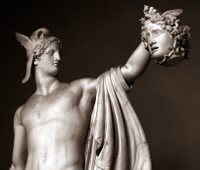The Myths of Ancient Argos
Argos is a famed location for myths and legends from the time of the Ancient Greeks. The most famous involves the Medusa-slayer Perseus. The leader of all Greek gods, Zeus, and Danae (dotdot) were the parents of Perseus. Danae was the daughter of Acrisius of Argos. When he was very young, Perseus was prophesied to kill his grandfather, and so he and his mother were put into a chest and cast out to sea. He survived the trip and grew up on the nearby island of Seriphus. The king of that island, Polydectes, convinced Perseus to behead the only mortal Gorgon, Medusa. Anyone seeing a gorgon's face would turn to stone. Perseus used a shield as a mirror, to avoid looking at Medusa, and killed her, taking her head and putting it in a special knapsack. 
He employed Medusa's paralyzation power to defeat a sea monster that threatened the Ethiopian princess Andromeda, whom Perseus loved. (The two were later married and had seven children.) Perseus was riding on the winged horse Pegasus when he defeated the sea monster. Pegasus had emerged from the death of Medusa. Perseus kept Medusa's head, which still had its paralyzation power despite being severed from the creature's body, and used it on his enemies. Among those enemies was Atlas, the legendary Titan whose punishment for fighting against Zeus was to carry the heavens on his shoulders. Angered by Atlas for what he took to be a slight, Perseus turned Medusa's head on him and turned him to stone. Still standing in what is now Morocco are the Atlas Mountains. Perseus later gave Medusa's head to Athena, who wore it on her shield. It was later in Argos that Perseus fulfilled the prophecy that he would kill his grandfather; he threw a discus that accidentally struck his mother's father, Acrisius, who died from the blow. (Another version of this story has Perseus turning Medusa's head on his grandfather.) In his grief, Perseus left Argos and founded Mycenae as his capital; among his descendants was Heracles. Perseus later led Mycenaean forces in an attack on Argos and died at the hand of Megapenthes, king of Argos. Argos was also home to an influential following of the goddess Hera, the wife of Zeus. The architect Eupoloemos built the Heraeum, a sanctuary, in which was a famous statue of Hera, on a throne, made by the well-known sculptor Polyclitus.
|
|
Social Studies for Kids
copyright 2002–2026
David White




